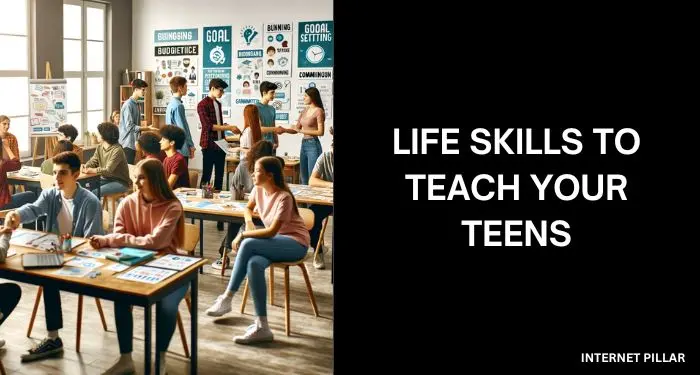Teaching teens life skills is important for their independence and social-emotional growth.
It is important to focus on self-awareness skills, social skills, decision-making skills and relationship building.
These skills help teens navigate life’s challenges confidently. Remember when teaching, it is a key to be patient and clear even with basic questions.
Teens growing into responsible adults need to learn essential life skills early on.
These skills “lifelong learning and adaptability” are valuable in both personal and professional life.
They help teens adjust to changes and face life’s hurdles smoothly.

While traditional education focuses on academic achievements, life skills often don’t get enough attention.
However, these skills are important for teens to become competent, self-reliant adults.
Parents play an important role in teaching these skills, ensuring teens are prepared for the future and can live independently.
Let’s get started.
25 Life Skills to Teach Your Teens
1. Financial Literacy for Teens
Teaching teens about money is important for their independence.
Key lessons include budgeting, understanding bank accounts, credit card use, saving for emergencies, charitable giving, record-keeping and assessing market values.
Emphasizing the balance between income and expenses and the importance of savings plans can set a strong foundation for their financial future.

2. Cooking Skills
Equipping teens with food-related skills is essential.
This includes grocery shopping, using kitchen appliances, understanding utensils, cooking healthy meals, food storage, reading nutrition labels and the risks of excessive junk food consumption.
These skills are vital for their survival and well-being.
3. Clothing and Style
Teens often experiment with their style, influenced by peers.
Teaching them to select appropriate outfits, understand sizing and occasion-specific dressing is important.
Skills like sewing, ironing, laundry, folding, packing and understanding fabric care can foster independence and self-expression.
4. Cleanliness and Hygiene
Maintaining personal and environmental cleanliness is fundamental.
Teens should learn to dust, vacuum, mop, keep the bathroom and kitchen clean, manage garbage and declutter.
These practices contribute to a healthy living space.

5. Healthcare and First Aid
Teens should be aware of basic healthcare, including when to seek medical help, managing minor ailments, understanding health insurance and responding to emergencies.
Basic first aid knowledge is important for their safety and that of others.
6. Basic Social Skills
Developing basic social skills and manners is key for successful interactions.
Encourage hobbies, friendship maintenance, relationship appreciation, party etiquette and respect for diverse opinions to enhance their social life.
7. Organization Skills
Good organization leads to efficient time management.
Teaching teens the ‘Kaizen’ principle – everything in its place – can simplify their lives.
Using organizational tools can help declutter spaces and save time.

8. Home Management Skills
As teens grow, understanding home management becomes essential.
They should know how to find accommodation, manage bills, maintain cleanliness and handle basic repairs.
Introducing them to do it yourself (DIY) projects can boost their confidence in managing their living spaces.
9. Mastering Communication Skills
Good communication is more than just a business skill; it’s essential in personal life too.
Teens need to learn to express themselves clearly and respectfully, understanding that people have different communication styles and preferences.
Key aspects include recognizing individual temperaments, the importance of listening, empathy, negotiation and the use of various communication forms and tools.
10. Building Behavioral Skills
Developing a strong character involves cultivating healthy behaviors.
Encourage your teen to admit mistakes, apologize sincerely and be polite.
Instill values like morality, honesty and integrity.
Emphasizing the importance of asking for help when needed can also foster a sense of humility and interdependence.
11. Problem-Solving Abilities
Teach teens to confront challenges rather than avoid them.
Encourage them to think through problems, consider multiple solutions and make informed decisions.
This process strengthens their independence and critical thinking, preparing them for adult life.

12. Time Management Skills
Effective time management is important for teens to balance their diverse commitments.
Model positive habits, help them prioritize tasks and encourage the use of planners.
Establishing a routine can also streamline their daily activities, making them more productive.
13. Public Speaking Skills
Public speaking boosts confidence and enhances communication.
Start with low-pressure situations, emphasize the importance of body language and practice regularly.
Joining speaking groups can provide valuable learning opportunities and feedback.
14. Vehicle Maintenance Skills
Understanding basic vehicle upkeep is vital for any driver.
Teach your teen routine maintenance tasks like tire inflation, fluid checks and tire changes.
Educate them on safe driving practices, vehicle registration and insurance basics to ensure their independence and safety on the road.

15. Pet Ownership Skills
Caring for pets teaches responsibility and empathy.
Make sure teens understand the full extent of pet care, from feeding and cleaning to providing companionship, to prepare them for future pet ownership.
16. Using Social Media Wisely
Responsible social media use is important in today’s digital world.
Teach teens to present themselves professionally online and to evaluate the credibility of their information sources.
Understanding online safety is also key to protecting themselves in both physical and virtual spaces.
17. Job Application Skills
Applying for jobs or volunteer positions is an essential skill.
Encourage your teen to follow application instructions carefully and to learn resume creation, using resources like templates and design tools to stand out.
18. Navigating Skills
In an era dominated by digital maps, teaching teens traditional navigation skills, like reading paper maps and understanding cardinal directions, is important.
These skills are not only about survival but also about independence in travel, understanding public transit schedules and comprehending road terminology.

19. Financial Responsibility
As teens transition to adulthood, managing and paying bills becomes a vital skill.
They must learn to organize, track and timely pay for utilities, rent and other expenses to maintain good credit and secure their living situation.
20. Professional Correspondence
In the professional world, communication standards are high.
Teens need to grasp the nuances of writing professional letters and emails, ensuring clarity, formality and appropriateness, free from casual language and symbols used in texting.
21. Self-Defense Skills
Empowering teens with self-defense techniques prepares them for unforeseen dangers.
Training should focus on prevention, awareness and physical defense, providing them with options to de-escalate situations or defend themselves if necessary.

22. Understanding Governance
As future voters, teens must comprehend their government’s workings, the legislative process and the importance of political participation.
This knowledge enables them to make informed decisions and engage in civic duties effectively.
23. Educational Foundations
Beyond digital fluency, teens need robust traditional educational skills.
Encouraging reading for comprehension, writing in complete sentences and safe online practices fortifies their academic and professional capabilities.
24. Personal Grooming
Grooming is fundamental for health, social and professional interactions.
Teaching teens daily hygiene practices, skin and hair care and for girls, menstrual hygiene, is essential for their well-being and confidence.

25. Goal Setting and Prioritization
Helping teens identify their interests and set achievable goals fosters personal and professional growth.
Teaching them to adapt and refocus their objectives ensures they remain aligned with their evolving aspirations, leading to a fulfilling life journey.
These are some essential skills to teach you kids for a bright future.



